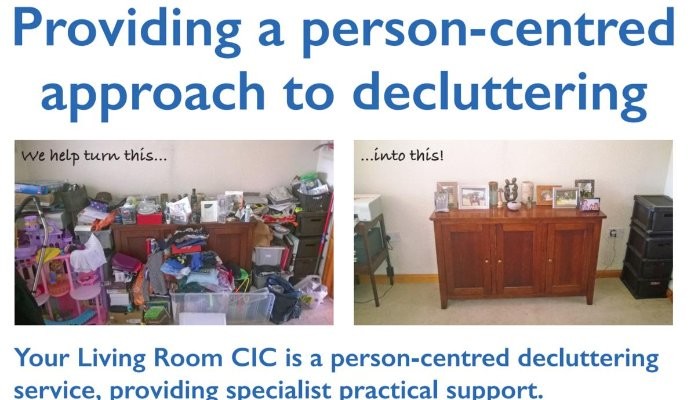
Why decluttering can support the Care Act
I have to declare an interest. This blog is about a friend and his company. But, come on…he’s not lounging around in a yacht and I’m not subliminally advertising his multinational. No, Harry’s knee-deep in other people’s belongings, decluttering their lives. So I hope it’s OK to talk about my friend and how he’s supporting those people to improve their lives.
Harry’s recently started a community interest company (CIC). A CIC that declutters. Let’s get this in context. At home I have a cupboard and when I open it, loads of bits of Tupperware fly out at me like in a cartoon. The plastic ends up on the floor, I wonder if the ‘five second rule’ has been broken or whether I need to wash it all up, and the lids never fit the containers.
We are all, to a certain extent, clutterers. But some people have a really challenging mental health issue in this area and these are the people who Harry supports. Sometimes known as hoarders, these people probably don’t like that term because it places them in a box with a title for their condition. But they do accumulate too much stuff and it can affect their health and wellbeing.
And wellbeing is central to the Care Act 2014. That legislation is something that we at SCIE are offering training on, and we have other Care Act resources. It’s no surprise that one of Harry’s co-directors is a fireman. If you declutter, there’s less chance of a house catching fire. But it goes much further than that. Decluttering can improve mental and physical health, it can provide wellbeing and it can give someone confidence and a sense of worth. All of the things that underpin the philosophy of the Care Act.
Harry tells me that while I spend all day on a computer, he’s on his hands and knees, sifting through people’s possessions and playing God about what stays and what goes. But, within that, he says that ‘Your Living Room CIC’ provides person-centred, practical support. Once the decluttering is done, it’s vital that it’s sustained, otherwise what’s the point?
Harry says that the vision of the CIC is to make homes as functional and comfortable as possible, according to the preferences of the person that lives there. The good news is that the local council – Harry operates in and around Colchester – is getting on board and referring clients to the business. The company also take referrals from housing associations, charities and other support agencies. It sounds like a great example of preventative work.
It can prevent someone’s situation deteriorating, like the man who came back from hospital to a tidy house. Without the clutter, he’s got more chance of staying at home and wanting to stay at home. Of course, that man needs other community support, and Harry’s fully aware of this. But his company’s playing their part in the great jigsaw that can be the care and support system, along with nurses in hospital, OT specialists in the home and the people in the local shop who offer occasional support from the community.
At SCIE we’re keen to highlight, where possible, how local communities can play their part in providing care and support. And this is just the sort of thing that sees the community coming together to do something about it. Wouldn’t it be great to see it go country-wide? But Harry knows that it’s early days and for the moment, he’s happy to be on his hands and knees, placing things in bins or back on shelves, one item at a time.